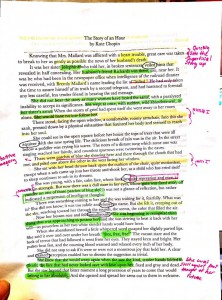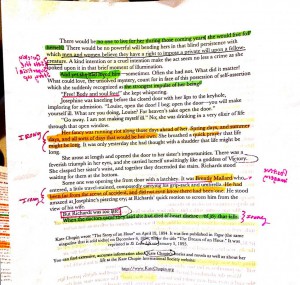“The Story of an Hour” was a fun read because it was short and sweet. There was a lot of emotions and feelings put into the story that made the read relatable and connectable. When reading the story and marking it up to pull out particualr themes i noticed how emotional “The Story of an Hour” is. The first half of the story I pulled out the words and phrases killed, bearing the sad message, storm of grief, physical exhaustion, haunted her body, sob, quite motionless, , and sob in its dreams. All of these words and phrases are negative and bring a wave of bad feeling across me. The main character Mrs. Mallard was going through a lot coming to the realization of her husbands death and her new found freedom. The words and phrases that I pulled out highlight her emotions during the early stages to perfection. Mrs. Mallard showed strong signs of grief in the beginning of the story that you first think she is sad her husband has died. ONce the sad wave has rolled over Mrs. Mallard she beings to feel amazing. Some words and phrases to describe Mrs. Mallards feeling and emotions in the second half of the story are free, bright, keen, joy that held her. pulses beat fast, love uptown her,, live for herself, self- assertion, love, and goddess of victory. It is obvious that the mood has completely changed sides and now Mrs, Mallard is filled with joy. Her husband is dead and she has come to the realization she can now live her life for herself and she is now free. The author of the story Kate Chopin does a great job at giving small hints to aid the reader in feeling the true mood of the story. Every single descriptive word stood out to me and left an impression in my head. Have it be positive or negative. There was a real hot and cold to this story that was delightful and made the short story come to life.
Tag Archives: kate chopin
The ironic story of Mrs. Mallard
While reading “The Story of an Hour” by Kate Chopin, a reoccurring literary technique I kept coming across was irony. First, the story sets up with the knowledge that Mrs. Mallard has heart problems and is about to find out that her husband has died. Readers might suspect that combined with her heart troubles, the news of her husbands death would upset her so much, she would die too. Ironically enough, the story goes on to describe her joy with the revelation of her new found freedom. Another pattern that can be seen in this writing is imagery. For example, when Mrs. Mallard is gazing out of the window at the patches of blue sky or the spring trees, there is a sense of looking toward the future or new beginnings. After which she first expresses verbally that she is free. Ms. Mallard admits her love for him, but that now she could “live for herself”, she even prays that her life will be long. Imagery can be shown to reflect her emotions here as well, and she thinks the spring and summer days that will now belong to her.
Again irony strikes, and suddenly through the front door her husband Brently Mallard enters with absolutely no knowledge of the railroad accident. Imagery here depicts Mr. Mallards appearance as “a little travel-stained, composedly carrying his grip-sack and umbrella” (which explains that physically he is healthy – and not dead). Mr. Mallard was surprised at Mrs. Mallards reaction to him, and in the final act of an ironic twist, Mrs. Mallard dies. When the doctors arrive, the story states that “she had died of heart disease – of the joy that kills” which leaves open to the reader to interpret that it was assumed she was so overjoyed to see her husband alive; it killed her. A theme of this writing is tragedy, since it seems inevitable that Mrs. Mallard would die of her heart disease throughout the reading.
Exalted
Exalted (adjective)
Definition: raised or elevated, as in rank or character; of high station: an exalted personage.
Source: http://dictionary.reference.com/browse/exalted
Encountered in: “The Story of an Hour” by Kate Chopin (12th paragraph)
Quote: “She did not stop to ask if it were or were not a monstrous joy that held her. A clear and exalted perception enabled her to dismiss the suggestion as trivial”
Now that Mrs. Mallard has expressed that she is “free, free, free!”, with a clear understanding of the word exalted, the sentence explains how she feels a higher level of self to omit if the joy kept her or not.





